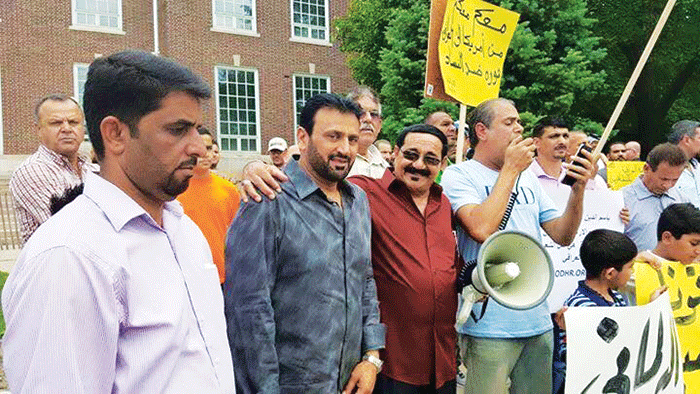
DETROIT — Local Iraqis are expressing solidarity with demonstrators in their homeland. The wave of protests rocking Iraq over poor services and government corruption have prompted them to call for reforms.
Last weekend, a group of Iraqi Americans protested for reforms in Iraq outside the old Dearborn City Hall on Michigan Avenue.
The protesters chanted, held up signs and Iraqi flags and even brought a water heater. Another protest was scheduled to take place Friday, Aug. 14 outside the Consul General of Iraq’s office in Southfield.
Nabil Roumayah, a longtime Iraqi American leader and head of the Iraqi Democratic Union, said the message demonstrators hoped to convey on Friday was that Iraqis will not stop protesting until their demands are met.
The Iraqi Democratic Union sent letters to the Iraqi government and members of Congress, urging them to address the demonstrators’ demands.
“The American government has to urge the Iraqi government to take action,” Roumayah said.
Temperatures in Iraq this summer have exceeded an unbearable 120 degrees and started the movement for reforms. The heat has reportedly resulted in a number of civilian deaths.
“People just could not take the heat anymore,” said Mehmed Yaqubi, a young Iraqi American activist. “I heard some people even died in the refugee camps “The heat this summer really triggered the protests.”
Anti-government protests have occurred in Basra, Najaf, Babil, Nasiriya and Baghdad.
Electricity supplies began collapsing after the 2003 U.S. led invasion. In recent years, insurgents have targeted transmission towers and other infrastructure.
While power outages and corruption has plagued the country for more than a decade, activists say conditions have now become too difficult to ignore.
“They are protesting now because there is only so much they can take,” Roumayah said. “There is a limit to everything. There is corruption. The system has become unbearable. We are Iraqi Americans. We love our country, Iraq.”
Yaqubi said recent actions taken by Iraqi Prime Minister Haider al-Abadi make him more hopeful about reforms taking place.
Al-Abadi has introduced a range of reforms to cut back on elite entitlements. The sweeping reforms he has introduced include eradicating the posts of vice-president and deputy prime minister and starting a corruption inquiry.
Iraq had been rated by Transparency International as one of the 10 most corrupt countries in the world. It most recently ranked number five.
“Now the government is starting to listen and going after corruption,” Roumayah said. “There is a positive movement happening now.”






Leave a Reply